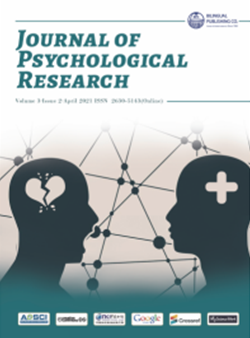-
689
-
610
-
375
-
296
-
296
Impact of Coronavirus Anxiety on Depressive Tendencies among Emerging and Young Adults
DOI:
https://doi.org/10.30564/jpr.v3i2.2966Abstract
Coronavirus, our new chemical enemy, have become successful in changing our lives to an extent that now we have to think twice before stepping out of house. It has impacted negatively on not only our physical health but also psychological health. The current study was done to see the impact of coronavirus related anxiety on depressive tendencies. Further, it was assessed whether there is any interaction between gender and coronavirus anxiety on depressive tendencies. The linear regression indicated that coronavirus anxiety is strongly related to depressive tendencies and that the coronavirus anxiety is a predictor of depressive tendency. However, two-way ANOVA indicated that there is an insignificant difference as to how males and females face depressive tendencies. Finally, there is insignificant interaction between gender and coronavirus anxiety on depressive tendencies. The implications, limitations and future suggestions are also given on the basis of the findings so obtained
Keywords:
Covid-19 pandemic; Coronavirus related anxiety; Depressive tendencies and mental healthReferences
[1] Ducharme, J. (March, 11, 2020). World health organization declares COVID-19 a ‘pandemic’. Here’s what that means. Retrieved from: The WHO Just Declared Coronavirus COVID-19 a Pandemic| Time.
[2] Rossi, R., Socci, V., Talevi, D., Mensi, S., Niolu, C., Pacitti, F., ... & Di Lorenzo, G. (2020). COVID-19 pandemic and lockdown measures impact on mental health among the general population in Italy. Frontiers in psychiatry, 11, 790. https://doi.org/10.3389/fpsyt.2020.00790.
[3] Gualano, M. R., Lo Moro, G., Voglino, G., Bert, F., & Siliquini, R. (2020). Effects of Covid-19 lockdown on mental health and sleep disturbances in Italy. International journal of environmental research and public health, 17(13), 4779. https://doi.org/10.3390/ijerph17134779.
[4] Pieh, C., Budimir, S., & Probst, T. (2020). The effect of age, gender, income, work, and physical activity on mental health during coronavirus disease (COVID-19) lockdown in Austria. Journal of psychosomatic research, 136, 110186. https://doi.org/10.1016/j.jpsychores.2020.110186.
[5] Wang, C., Pan, R., Wan, X., Tan, Y., Xu, L., McIntyre, R.S., Choo, F.N., Tran, B., Ho, R., Sharma, V.K., & Ho, C. (2020b). A longitudinal study on the mental health of general population during the COVID-19 epidemic in China. Brain, Behavior, and Immunity, 87, 40-48. https://doi.org/10.1016/j.bbi.2020.04.028.
[6] Torales, J., O’Higgins, M., Castaldelli-Maia, J. M., & Ventriglio, A. (2020). The outbreak of COVID-19 coronavirus and its impact on global mental health. International Journal of Social Psychiatry, 0020764020915212. https://doi.org/10.1177/0020764020915212.
[7] Sathyamurthi, K., Anjali, U.S., Kumar, A. P., Babu, A., Silpa, C.B., Hemalatha, P. & Krishna, J. (2020). Mental Health Status of Indian population during Covid19 outbreak. International research journal of education and technology, 1(2), 52-63.
[8] Raju J, Asirvatham R. & Madani A.H. (2021). Impact of lockdown during covid-19 pandemic on psychological wellbeing among healthy working adults. Black Sea Journal of Public and Social Science, 4(1), 34-41.
[9] Sharma, N., & Vaish, H. (2020). Impact of COVID–19 on mental health and physical load on women professionals: an online cross-sectional survey. Health care for women international, 1-18. DOI: https://doi.org/10.1080/07399332.2020.1825441.
[10] Beri, V (2021). Impact of COVID-19 on mental health of employed women residing in Delhi-NCR, India: Mediating role of working from-for home. Health care for women international, DOI: https://doi.org/10.1080/07399332.2021.1882463.
[11] Lee, S.A. (2020) Coronavirus Anxiety Scale: A brief mental health screener for COVID-19 related anxiety. Death Studies, 44(7), 393-401. DOI: https://doi.org/10.1080/07481187.2020.1748481.
[12] Kroenke, K., Spitzer, R.L. & Williams, J.B.W. (2001). The PHQ-9: validity of a brief depression severity measure. Journal of General Internal Medicine, 16(9), 606-613. http://dx.xoi.org/10.1046/j.1525-1497.2001.016009606.x.
[13] Chagas M.H., Tumas V., Rodrigues G.R., Machado-de-Sousa J.P., Filho A.S., Hallak J.E. & Crippa J.A. (2013). Validation and internal consistency of patient health questionnaire-9 for major depression in parkinson's disease. Age Ageing, 42(5), 645-9. DOI: https://doi.org/10.1093/ageing/aft065.
[14] Mazza, C., Ricci, E., Biondi, S., Colasanti, M.,Ferracuti, S., Napoli, C., Roma, P. (2020). A nationwide survey of psychological distress among Italian people during the COVID19 pandemic: immediate psychological responses and associated factors. International Journal of Environmental Research and Public Health, 17(9), 3165. DOI: https://doi.org/10.3390/ijerph17093165.
[15] Özdin, S. & Özdin, S. B. (2020). Levels and predictors of anxiety, depression and health anxiety during COVID-19 pandemic in Turkish society: The importance of gender. International Journal of Social Psychiatry, 66(5) 504-511. DOI: https://doi.org/10.1177/0020764020927051.
[16] Lei, L., Huang, X., Zhang, S., Yang, J., Yang, L., Xu, M. (2020). Comparison of prevalence and associated factors of anxiety and depression among people affected by versus people unaffected by quarantine during the covid-19 epidemic in southwestern China. Medical Science Monitor, 26, e924609. DOI: https://doi.org/10.12659/MSM.924609.
Downloads
How to Cite
Issue
Article Type
License
Copyright © 2021 Vanshika Beri

This is an open access article under the Creative Commons Attribution-NonCommercial 4.0 International (CC BY-NC 4.0) License.




 Vanshika Beri
Vanshika Beri





